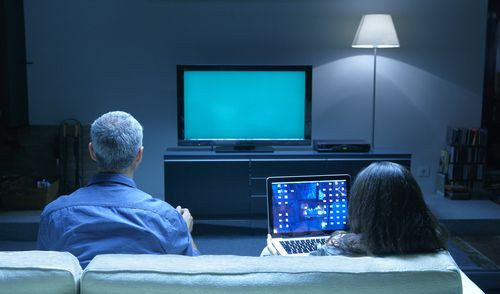Guilt May Ruin Your Relaxation If You Don't Take It Easy On Yourself

Guilt normally gets the best of us when we cheat on our diets, tell a white lie, or speak badly about a friend, but what if we’re just relaxing on the couch after a long day at work? Researchers from Johannes Gutenberg University Mainz in Germany have found people who play video games or watch television to relax at the end of the day may wind up feeling even worse.
It all comes down to what gives you pleasure after overcoming a difficult task that’s required a period of self-control and concentration, such as a long day at work. The study showed those people were in a state of ego-depletion, which is a temporary reduction in a person’s ability or willingness to engage in a task that exercises their will because their previous exertion of will, also known as an eight-hour day of work. If their downtime feels more like a dressed up version of procrastination, they’ll receive less benefit and more guilt in return.
“To get a better understanding of what ego depletion means, it is helpful to think of human willpower in terms of a ‘muscle.’ Whenever we have to use self-control to resist a temptation or to continue an unpleasant task, the strength of this ‘muscle’ is depleted,” the study’s lead author Leonard Reinecke told Reuters Health.
Each and every day people sit at their desks forcing themselves to focus, engage, practice patience with coworkers, and employ careful time management from breakfast to dinnertime. After hours of employing self-control, a person typically experiences ego-depletion and researchers have found people tend to desire comfort foods and easy, mindless entertainment.
“I think the new wrinkle that this study provides is context, so playing a video game isn’t inherently bad — it’s not necessarily going to make you feel good or bad,” Elliot Panek from the University of Alabama in Tuscaloosa, told Reuters Health, adding it depends how you feel leading up to playing a game or relaxing.
“But if you’ve been exerting willpower then you play the same darn video games or watched the same television, you’re not going to feel that same sense of recovery,” he said.
Researchers studied 471 participants from a gaming website in Germany and Switzerland and found television and computer games use can help people recover from ego-depletion, but the guilt that accompanies it can be poison to their relaxation. Guilt floods the body with the stress hormone cortisol and wreaks all kinds of havoc throughout the gastrointestinal tract, immune system, heart, and mind.
On average participants played 2.6 hours of games, while television viewers sat back for 1.73 hours, and those who reported ego depletion after half an hour to 16 hours of work or school that day felt guilt. Sometimes students and workers force themselves in front of the TV at the end of the day in an effort to cope with their daily stresses.
The key is to schedule times to work and play and designate them as times for being productive or for unwinding and relaxing. Only 37 percent of Americans feel like they’re actually doing a good job at managing their stress, according to the American Psychological Association, and with 20 percent rating their stress levels as an 8, 9, or 10 out of 10, there is cause to worry if they’re relaxing in a beneficial way.
Sitting in front of the TV with a cup of green tea, since it contains L-theanine, will help to relieve anxiety. Dark chocolate has the power to regulate levels of the stress hormone cortisol in addition to stabilizing metabolism. If that doesn’t do it for you, lay your head on a pillow and breathe slowly to lower blood pressure and heart rate. Trying pranayama breathing in yoga exercises reduces anxiety levels and balances the oxygen flow in the brain.
Relaxing is completely subjective and so long as it’s not causing harm to your body or mind, different approaches should be exercised until you find the right one. Whether it’s television, video games, eating chocolate, or practicing yoga, so long as you decide it’s not a waste of time and a necessity to relax from a long day, stress levels will subside.
“I think it would be helpful to reappraise media use — rather than seeing it as a guilty pleasure, a waste of time, and a proof of one’s own self-regulatory failure, it makes sense to also look at the bright side and think of media use as a deserved treat after a long working day and an effective recovery strategy that may help us to be more productive afterwards,” Reinecke said.
Source: Reinecke L, Hartmann T, and Eden A. The Guilty Couch Potato: The Role of Ego Depletion in Reducing Recovery Through Media Use. Journal of Communication. 2014.



























